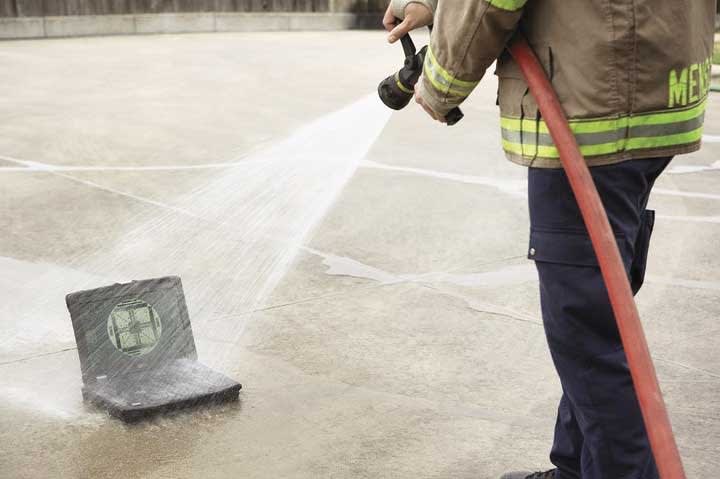Until last year, Dell was largely a no-show in the rugged computer market. A giant in the personal and office computer arena, the company didn't seem to have much interest in producing systems for patrol cars and military operations. But this year Dell is working hard to become a player in law enforcement mobile data systems.
Dell's second generation fully rugged laptop, the Latitude E6400 XFR, is not only tough; it's fast. The E6400 XFR's brain is an Intel Core 2 Duo processor with vPro technology. That's a state-of-the-art CPU, something uncommon in rugged computers. "You typically get technology minus one rather than state of the art in most rugged systems," says Steve Gilbert, world wide business development manager for Dell Rugged Computing Solutions.
Dell developed the E6400 XFR with "no compromise," according to Gilbert. In practical terms, that means that the company has loaded this thing for bear. In addition to the latest Intel processor, the E6400 XFR has a powerful NVIDIA Quadro graphics card and a 120GB hard drive or optional solid state drive ($100 extra).
Gilbert admits that the E6400 XFR packs a lot of punch for a mobile system, but he says customers need it because of computer-aided dispatch software and other graphics heavy law enforcement tools. "These programs are very, very demanding. So the performance level of the box has to meet this need," he explains.
The power of the E6400 XFR is hard to dispute. Independent labs and third-party testers have clocked it at 90 percent faster than its leading competitor. Of course, all that power could come at a premium, but Gilbert says that Dell is pricing the E6400 XFR to be competitive with other rugged systems on the market.
Speed is only one part of the E6400's story. It's also tough as nails. It's may be even tough enough to drive nails.
Not only does the E6400 meet Mil-Spec 810F, the government's standard for rugged computing platforms, in some categories it exceeds that standard.
Mil-Spec 810F requires that the computer survive a three-foot drop onto a simulated floor of plywood-covered concrete. Dell used a four-foot drop, and it then added a twist. The three-foot-drop test is usually performed with the computer closed and shut off. Dell performed the three-foot-drop test on the E6400 XFR open and running.
And that's not the only torture that Dell devised for its new box. Mil-Spec 810F requires the computer to be subjected to 50-mile-per-hour blown sand and rain. Dell passed that test with the E6400 XFR, then it decided to hit the machine with spray from a fire hose. Watch the video:
Gilbert says the secret to the E6400 XFR's toughness is "Ballistic Armor." The case is made of a high-tech non-metallic material used in missiles and high-performance aircraft. Called "Ballistic Armor" by Dell, this material won't stop a bullet, but it does provide exceptional protection from impact and from water and dust.
The case is not the only tough part of the E6400 XFR; the screen has a special coating that prevents damage and makes it easier to see in sunlight. Dell tested the screen by dropping one-inch-diameter stainless steel marbles from a height of 30 inches directly onto it. The test was repeated 25 times, and the screen survived. To save battery power and make the screen easier to read, it is lit by LED technology.
Dell has not yet made its mark or its marketing power felt in the rugged mobile data market, but Gilbert is confident that it will soon. "We have hundreds of evaluation units now out with the agencies," he says. "They will put them in their vehicles and give them a real test."
If the E6400 is as fast and tough as advertised, it will pass those tests with flying colors.
Visit Dell Online













